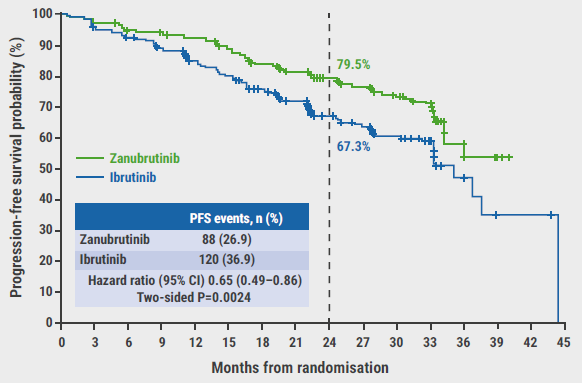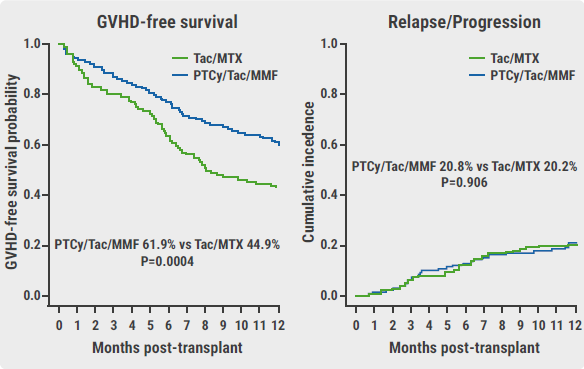https://doi.org/10.55788/c836a42e
The second-generation Bruton’s tyrosine kinase (BTK) inhibitor zanubrutinib was superior to chemo-immunotherapy in newly diagnosed patients with CLL/SLL without del(17p) [1]. At ASH 2022, Prof. Jennifer Brown (Dana Farber Cancer Institute, MA, USA) presented the final PFS data on zanubrutinib in CLL/SLL from the phase 3 ALPINE study (NCT03734016) [2]. This trial randomised 652 patients with relapsed or refractory CLL/SLL 1:1 to zanubrutinib 160 mg twice daily or to ibrutinib 420 mg once daily.
After a median follow-up of 29.6 months, the PFS was significantly longer in participants who were exposed to zanubrutinib than in those who received ibrutinib (HR 0.65; 95% CI 0.49–0.86; P=0.0024; see Figure). The corresponding 2-year PFS rates were 79.5% and 67.3%. Prof. Brown added that this result was consistent in patients with del(17p) and/or TP53-mutated disease (n=150; HR 0.52; 95% CI 0.30–0.88; P=0.134). The 2-year PFS rates for this subgroup of patients were 77.6% and 55.7%. Additionally, fewer patients died in the zanubrutinib group compared with the ibrutinib group (14.7 vs 18.5%; HR 0.76; 95% CI 0.51–1.11), but this did not reach statistical significance.
Figure: Zanubrutinib is significantly superior to ibrutinib regarding PFS [1]

PFS, progression-free survival.
Reprinted from Brown JR, et al. Blood. 2022;140 (Supplement 2):LBA-6. DOI: 10.1182/blood-2022-171538. Copyright 2022, with permission from Elsevier.
According to Prof. Brown, the safety profile of zanubrutinib was more favourable than that of ibrutinib. Serious adverse events (AEs) occurred in 42.0% of participants on zanubrutinib and in 50.0% of participants on ibrutinib. AEs leading to treatment discontinuation were observed in 15.4% of the participants in the zanubrutinib arm and in 22.2% of the participants in the ibrutinib arm. Importantly, a lower rate of serious cardiac AEs was reported for participants receiving zanubrutinib than for those receiving ibrutinib (1.9% vs 7.7%).
The ALPINE study showed the superiority of zanubrutinib over ibrutinib with regard to PFS in patients with relapsed or refractory CLL/SLL. Moreover, this head-to-head comparison revealed a favourable safety profile of zanubrutinib.
- Tam CS, et al. Lancet Oncol. 2022;23(8):1031–1043.
- Brown JR, et al. Zanubrutinib Demonstrates Superior Progression-Free Survival (PFS) Compared with Ibrutinib for Treatment of Relapsed/Refractory Chronic Lymphocytic Leukemia and Small Lymphocytic Lymphoma (R/R CLL/SLL): Results from Final Analysis of ALPINE Randomized Phase 3 Study. Late-Breaking Abstract 6, ASH 64th Annual Meeting, 10–13 December 2022, New Orleans, LA, USA.
Copyright ©2023 Medicom Medical Publishers
Posted on
Previous Article
« Ibrutinib plus venetoclax displays long-term benefits in CLL Next Article
Head-to-head: VMP versus Rd in transplant-ineligible MM »
« Ibrutinib plus venetoclax displays long-term benefits in CLL Next Article
Head-to-head: VMP versus Rd in transplant-ineligible MM »
Table of Contents: ASH 2022
Featured articles
Acute Lymphoblastic Leukaemia
Blinatumomab candidate for standard-of-care in newly diagnosed B-ALL
High-dose methotrexate or standard interim maintenance in young patients with ALL?
Acute Myeloid Leukaemia
Excellent results for triplet regimen in FLT3-mutated AML
MRD by qPCR prognostic of outcomes in venetoclax-treated NPM1-mutated AML
Promising results for triplet therapy with magrolimab in AML
Should we use intensive chemotherapy prior to allo-HCT in relapsed/refractory AML?
Chronic Leukaemia
Zanubrutinib wins battle of BTK inhibitors in relapsed or refractory CLL/SLL
Ibrutinib plus venetoclax displays long-term benefits in CLL
Multiple Myeloma
Talquetamab further investigated in heavily pre-treated MM after promising phase 2 data
Promising results of elranatamab for MM in phase 2 MagnetisMM-3 trial
Deep and durable responses for quadruple therapy in smouldering MM
Ultra-sensitive MRD assessment in MM with BloodFlow
CAR-Hematotox score proves useful in relapsed/refractory MM
Head-to-head: VMP versus Rd in transplant-ineligible MM
Lymphoma
Ibrutinib added to ASCT improves clinical outcomes in mantle cell lymphoma
High-dose chemotherapy plus ASCT superior to standard immuno-chemotherapy in primary CNS lymphoma
Odronextamab has considerable anti-tumour effects in relapsed/refractory diffuse large B-cell lymphoma and follicular lymphoma
Excellent results for AFM13-complexed NK cells in CD30-positive lymphoma
CAR-Hematotox score predicts toxicity, infections, and clinical outcomes in MCL
Myeloproliferative Neoplasms
Efgartigimod successful in immune thrombocytopenia
INCA033989: novel investigational agent for CALR-mutated MPN
Ruxolitinib mediates clonal evolution of RAS pathway mutations in MPN
Immune Thrombocytopenia
Long-term risk for haematologic disease in persistent, isolated mild thrombocytopenia
Various Topics
C1 inhibitor deficiency linked to thrombosis
Durable responses to gene therapy in haemophilia A
Long-term benefits from beti-cel in transfusion-dependent β-thalassaemia
Neutrodiet: non-restricted diet is the preferred option after SCT
Iptacopan offers solution for patients with PNH and residual anaemia after standard-of-care
Novel therapy may replace standard-of-care prophylaxis for GVHD
LMWH does not result in higher live birth rates in women with inherited thrombophilia
Related Articles

February 20, 2023
Novel therapy may replace standard-of-care prophylaxis for GVHD
February 20, 2023
Long-term benefits from beti-cel in transfusion-dependent β-thalassaemia
© 2024 Medicom Medical Publishers. All rights reserved. Terms and Conditions | Privacy Policy

